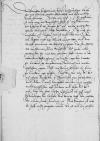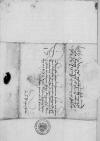Dem durchlauchtigen, hochgebornen fursten und herren, hern ⌊Albrechten⌋, von Gots gnaden marggraffen zu ⌊Brandenburg⌋, / in ⌊Preussen⌋, / zu ⌊Stetin⌋, ⌊Pommern⌋, / der ⌊Cassuben⌋ und ⌊Wenden⌋ hertzog, / burggraff zu ⌊Normberg⌋ und furst zu ⌊Rugen⌋, / unserm hochgunstigenn, lieben herren unnd freunde /
In ⌊furstlicher durchlaucht⌋ eigne hende /
Durchlauchter, hochgeborner furst, hochgunstiger, lieber her und freundt. / Unsere freuntliche und vleis willige dinste zuvoran. /
Wie wir negst Ewer Furstlichen Durchlaucht ⌊⌋, / so uns was von koniglichem hoffe zu wurd kommen / die ehefreud der ⌊jungen koniglichen maiestet⌋, / unsers gnedigisten herren, belangend, / solchs derselbten Ewer Furstlichen Durchlaucht nicht zuvorhalten / etc. Nechten spat ist unser bott von ⌊Crockaw⌋ den sechsten tagk dits monats ausgeritten, / und uns brieffe geantwort, / die klerlich anzeigen, / das den XXVIII des vorschinnen Iunii / ⌊konigliche maiestet⌋, unser aller gnedigister her, mit dem gantzen hoffe, / etwan in der alten kranckheit schwach, / im nassen regenden wetter zu Crokaw sey eingekommen, / dornach aus vielem teglichem regen / solche wasserung gefolget, / die zuvor zu Crockaw nÿe gesehen. / Nachdem sein von ⌊romischer koniglicher maiestet⌋ zwen botschafter, her ⌊Sigmundt von Herberstein⌋ / und Adam Carolii, eingeholt wurden, / mit welchen entlich entschlossen / uff furdern und beger romischer koniglicher maiestet, / das die zeitt solcher ehefreudt bis uff negst zukunftigen der heiligen drei konige tagk den sechsten des neuen jares Ianuarii / etc.
Aus ⌊Hungern⌋ ist aber bei hoffe nichts gewesen neues. / Es ist wol ein geschrei kommen, / das der ⌊Turck⌋ todt solt sein, / und das sein botschafter in der ⌊Reuschen Lemburg⌋ an sey kommen. / Was der wirt brengen, / wirt die zeit erweisen. /
Dis alles hab wir Ewer Furstlichen Durchlaucht in der eyll mit den ersten unangezeigt nicht wollen lassen / domit, / so die villeicht umb herbergen, / wie wir bericht, jemants het zuvor ausgeschickt / von wegen solche ehefreud zubesuchen, / das die dieses vorzogs wissenschaft hette, / welchs wir derselben Ewer Furstlichen Durchlaucht, / in der gunst wir uns freuntlich bevelhen, / wilferiger weis nicht haben mugen bergen. /
⌊Ioannes⌋, von Gots gnaden bischoff zu ⌊Ermelandt⌋ /
Ioannes episcopus Varmiensis manu propria subscripsi


